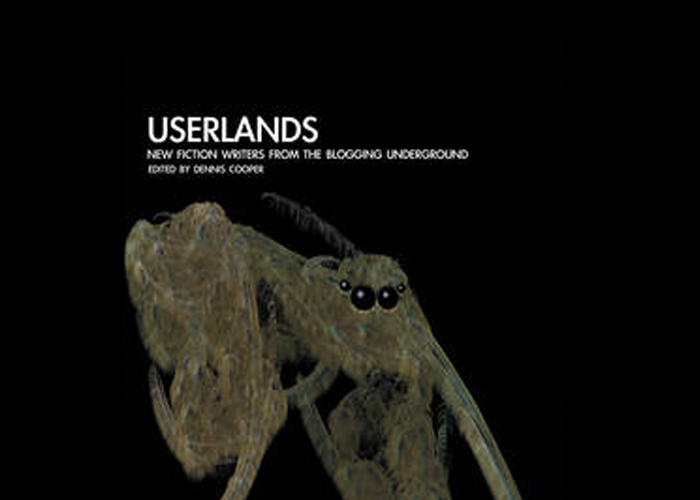In a previous article, I discussed how Google had removed Dennis Cooper’s blog and email with no warning. As of the time I’m writing this, Google has not restored either nor even issued a statement regarding the matter. It looks like Cooper is going to have to file a lawsuit to get the work stored on his accounts back. It seems as good a time as any to take a look back at an anthology that came entirely from his blog.
Userlands, released in 2007, came together from authors Cooper had met through the comments of his blog. Some had never published anything before, some had been writing and being published for years. As he states in the introduction, Cooper hoped this would display some of the most promising voices using the internet to display their talent.
Patrick DeWitt is probably the most well-known author from this anthology. His contribution here is an excerpt from this first novel, Ablutions. This story is told through a set of notes a bartender is jotting down for a novel that he’s working on.
“Discuss the regulars. They sit in a line like ugly, huddled birds, eyes wet with alcohol. They whisper into their cups and seem to be gloating about something—you will never know what. ”
I found this excerpt interesting enough that I’ll pick up the novel at some point. However, I can’t say I found it the most memorable piece in the book. After this, DeWitt would eventually go on the write the award winning novel The Sister Brothers.
A couple authors I was already familiar with have stories here. M Kitchell (writing under Mike Kitchell here), whose book Spiritual Instrument I previously reviewed on this site, contributes a story called “When I Was Young, I Always Had the Same Nightmare.” While told in a disjointed manner, it doesn’t have the formal experimentation that Kitchell’s work would later gravitate to. It does, however, contain the hazy, dream-like atmosphere that ran throughout Spiritual Instrument. The story concerns a young man who has a reoccurring nightmare of being his neighbour committing suicide.
“At only twelve years old, I didn’t start asking why I had to do my homework, I started asking why I had to live.”
A short but haunting piece that showed the promise Kitchell fulfilled in Spiritual Instrument.
Zachary (Zac here) German was another author who I had read before. “letting me out first part,” shows similar fixations that German explored in his later novel Eat When You Feel Sad. The story is a stream of consciousness piece that tells of a party of a boat where figures such as Brian Eno, Kanye West, and Dennis Cooper himself show up. Many of the narrator’s thoughts taper off or end with an “uh.”
“nobody smokes or sleeps or anything. i think just about every album ever is here but people keep saying they haven’t heard of things, like prurient and uh uh the first odb album. i dunno.”
It’s an entertaining piece, and it’s a bit ironic it comes as early in the book as it does. The worst pieces in the book are pointless yarns about young people going to parties, doing drugs, and usually having a regrettable sexual encounter. German’s piece almost feel like a parody of these.
The worst of these is a story by Robert Siek called “Sixteen.” A dull story of teenagers going to a goth club that ends with this awful joke.
“And in unison they respond, ‘We won’t say cheese, but we’ll say drugs!’
‘Okay, say drugs!’
‘DRUGS!!!’
I snap the photo.”
I cringed when I read this. This is a completely worthless piece that should have stayed on Siek’s hard drive.
Thankfully, these stories are in the minority. Most of the pieces in the book are enjoyable. For example, James Champagne’s “Kali Yuga” is a non-fiction piece about working at Barnes and Noble. The rants against the store muzak, the customer’s behaviours, and the shit he has to put up with at the store are hilariously over the top.
“On one of the tables I find a piece of paper with these words on it, hastily written down: HELP I HAVE BEEN TAKEN HOSTAGE BY SOME GUY HE IS TORTURING ME IF YOU HAVE A HEART CALL POLICE. There are a lot of teenagers around so I assume it is someone’s idea of a prank.”
The final piece, “My Body’s Work” by Matthew Williams, blurs the line between fiction and non-fiction. It tells what may or may not be an autobiographical story of working as a male prostitute.
“I want everything that happens to be as important as everything that has already happened. And I can’t find my way to those things that happened. So I try and hold onto what is happening. A short celebration of a moment.”
Both disturbing and engaging, it’s an excellent way to end the book.
Some of the coverage you find on Cultured Vultures contains affiliate links, which provide us with small commissions based on purchases made from visiting our site.

